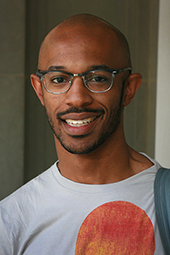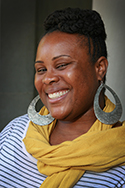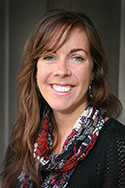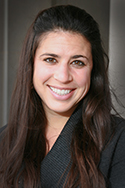When you chose to come to Carolina you probably arrived with a strong sense of commitment to your community. As someone once said, “Public service is in the DNA of Carolina students.”
Our faculty shares that DNA. It is manifest in their teaching, research and, of course, service.
This commitment to giving back, to community, to problem-solving, drives our graduate students to be leaders even before they graduate.
Here’s a sampling of what a few of them are up to.
Addressing the plight of African-American males

Few issues are more critical than our society’s failure to correct the mistreatment, neglect, and persecution of young African-American males. William Jackson is out to change this. As a chemistry major at Norfolk State University, William noticed how few men of color were pursing science degrees. He put plans to become a professor on hold in order to teach high school science – first in Atlanta and then in Hampton, Va. His goal was to help more African-American males study science and consider careers in the field.
Now, as an educational psychology doctoral student here, William developed his idea of creating a nonprofit – Village of Wisdom – dedicated to helping African-American youth succeed in school. Recently, the nonprofit group Echoing Green named William a 2014 Black Male Achievement Fellow. The award comes with a $70,000 grant to help him launch his Durham-based nonprofit.
Focused on parents of African-American boys, VOW will provide their parents with resources to help them communicate to these young men about their true potential. Participating parents will learn about racial identity and confidence development as well as strategies to help their child navigate racial biases and discrimination. The latter is a particular concern as black boys are much more likely than their white counterparts to be disciplined and suspended from school. Supporting parents in talking with their sons about racial identity and bias builds their self-confidence and helps them become more resilient in the face of persistent racial discrimination. This can significantly improve a child’s overall academic performance and aspirations.
As a SOE student, William has also worked with the consulting firm Frontline Solutions to design learning environments for both school-age and professional audiences. In addition, he has presented at several national and regional conferences on the topics of parent intervention programs and self-regulated learning. He is a former Education Pioneers fellow and a recipient of UNC’s Doctoral Merit Fellowship. After he completes his doctorate, William hopes to expand the Village of Wisdom well beyond the Durham area.
Promoting global competency education
The phrase “globally competent educators” rolls frequently and easily off tongues these days but it isn’t at all clear what this means.

Graduate students Jessie Montana Cain, Hillary Parkhouse, and Ariel Tichnor-Wagner noticed that, despite the ubiquitous rhetoric, there was little to guide teachers and teacher educators committed to bringing greater international perspectives and information to their classrooms. So they set out to change this.
Working with Associate Professor Jocelyn Glazier, the students created a website designed to provide specific ideas for practicing educators. With funding from the

Longview Foundation, the Globally Competent Teaching Continuum was launched this summer.
Through a partnership with LEARN NC and World View, the website includes lesson plans and videos illustrating the 12 elements of globally competent educators – including

dispositions, knowledge, and skills. In addition, the students have enlisted a group of seasoned global educators who have offered to consult with educators who need support and ideas.
The GCTC is a particularly valuable tool intended to help teachers reflect on their global competence and determine where they are on a continuum of competencies.
The tool underwent a two-year process of development that included a review of the literature to inform a draft rubric that was then vetted by teachers and other experts. After collecting and analyzing the data from teachers who used the tool, the students refined it further and subjected it to yet another round of expert review before adding it to the website.
The project reflects the commitment of the three students to bringing greater international awareness, knowledge, and understanding to school and university classrooms. Each brings extensive international experience to the project.
A Ph.D. candidate in the Educational Psychology, Measurement, and Evaluation program, Jessie’s undergraduate program included study abroad experiences in Cuba and Jamaica. Subsequently, she taught Spanish and English as a Second Language in Massachusetts, New York, and North Carolina.
As a research fellow at the Carolina Institute of Public Policy, Jessie headed the development and implementation of a state-wide assessment of professional preparation and experiences of novice teachers. She is currently the instructor for Social Justice for Educators and working on a dissertation to develop and initially validate an assessment of Multicultural Teacher Capacity.
Hillary, a Ph.D. student in the Culture, Curriculum, and Change strand, taught U.S. History and Literature and Honors British Literature at a private bilingual school in Santo Domingo, Dominican Republic. Later, she taught bilingual U.S. History and English as a Second Language, among other subjects, at a New York City high school.
As a doctoral student, Hillary has traveled with student teachers to Beijing where they participated in four weeks of student teaching. She has also studied in Oxford, England and in Guatemala and has traveled to Peru, Bolivia, Argentina, Puerto Rico, Vietnam, Laos, Cambodia, Thailand, and throughout Western Europe.
A Ph.D. student in Policy, Leadership, and School Improvement, Ariel taught elementary school in Phoenix, Arizona, for three years in general education and structured English immersion classrooms. She has been a teaching assistant for preservice teachers in methods and assessment and education policy, worked on research projects that aimed to build relationships between local North Carolina schools and Latino immigrant families, and has served on the education committee for the Refugee Community Partnership, a grassroots organization that provides educational and social services to relocated Burmese and Karen refugees.
She has had various international educational experiences, including studying abroad in London, England, volunteering in schools and after-school educational programs Peru, Guatemala, Costa Rica, and Dominica, and working as a trip leader for high school student summer abroad experiences in Israel and Nicaragua.
These four students exemplify the type of graduate students with whom we are privileged to work here in the School of Education. They bring a passion for changing the world and the talent and dedication commensurate with the task. They don’t wait until they graduate to dig into the challenges we face in education and society – they are making a difference now.
They’re not just the future – they are the present as well.